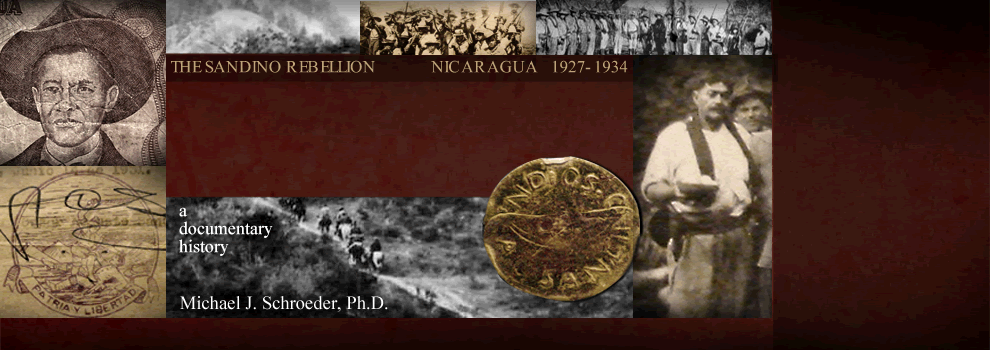|
T R A N
S C R I P
T I O N
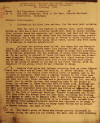 DEPARTMENT OF NORTHERN BLUEFIELDS, DEPARTMENT OF NORTHERN BLUEFIELDS,
GUARDIA NACIONAL DE NICARAGUA,
PUERTO CABEZAS, NICARAGUA,
20 February 1931
From: The
Department Commander.
To:
The Area Commander, Area of the East,
Guardia Nacional, Bluefields, Nicaragua.
Subject: Intelligence.
1. Information elicited from natives,
for the most part reliable.
That the raid of the bandits in January
last, under Abraham Rivera as jefe was a
mere scouting expedition, made to secure
information, procure boats and supplies,
get recruits, and test out the Guardia
strength. Arms were also taken from the
Indians upon every possible occasion,
but it was not the policy of Rivera to
offer violence to the Indians or other
natives along their route, unless they
were known to be Marines or Guardia
sympathizers.
At least two persons were killed, one
negro and one Mosquito Indian, although
most reports state four persons killed,
all of whom were either negros or
Mosquito Indians. These killings were
perpetrated by Timoteo Altamirano who
was sub-jefe of group under Abraham
Rivera. It was partly on account of
these killings that Rivera and
Altamirano disagreed. This disagreement
resulted in a fight between Rivera and
Altamirano, and the latter with four of
his friends were kicked out of the group
at Waspuk on the way up the river.
Rivera, with the remainder of the group,
about 30 men returned to Bocay.
2. Reports from spies and Indians
returning from up river (Wanks) state
that there are at least 300 bandits, or
rather outlaws, of all nationalities in
the Patuca river section north of
Awawas, and in the vicinity of
Kiplapini. They have a regular outpost
on the river near Awawas situated so
that it enables them to see long
distances both up and down the river.
These outlaws are a particularly bad
lot, are well armed, live by cattle
raising, and smuggling arms to the
people at Bocay. The outlaws in these
sections have no known jefe, although
all acknowledge Pedron and Sandino.
Their raids are similar to the last one
made last September when Jose Lleset was
killed at Aguasbila, and are made more
with intention of murder, pillage and
private vengeance than in the form of
organized banditry. Timoteo Altamirano
was allied with them after his escape
from the Line here, following the
killing of a Sirian at Snaki on 22
January 1930. Timoteo Altamirano is a
relation of Pedron Altamirano, believed
to be a cousin. The outlaws from the
Patuca River-Awawas-Kiplapini section
are reported to be ready to join in
force the bandits group at Bocay under
Rivera for an attack on Puerto Cabezas,
the Cape or both.
3. “The bandit group at Bocay has become
greatly increased in numbers during the
past six (6) months. The main camp is
some distance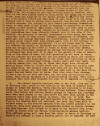 [p. 2] up the Bocay River.
The reasons given by natives for the
increase in size of this group, are that
the concentrated drives by Guardia and
Marines in Segovia and Jinotega on the
bandit groups have caused many
desertions, and that many of these
deserters from the bandit ranks have
collected at Bocay. Abraham Rivera is
the only known Jefe, but alleges he has
been ordered there by Sandino, and that
he has been placed there to facilitate
the smuggling of munitions, arms and
supplies to the bandit groups in Segovia
and Jinotega. A deliberate effort has
been made to gain favor with the Bocay
Indians with a view to having their
support, and has met with considerable
success. The Indians in this region
professing themselves ready to take part
in any attack on Guardia or expedition
to Puerto Cabexas or Cabo Gracias. What
means, exactly, has been used to gain
the confidence of the Bocay Indians is
not known, but their feelings and
sympathies have been cleverly brought
over to the side of the bandits. The
presence of several foreigners in this
group has been reported; three of them
either Germans, Hungarians or Russians,
one American, and several Mexicans and
Honduranians. Indians unfriendly to,
this group report that some months past,
(due to the Indians inability to
describe time accurately, it is not
known exactly when, but between the
middle of September and October) a large
shipment of arms was brought up the
river in boats to Bocay from near
Awawas, having been previously smuggled
in through the Patuca river section. No
estimate has been able to be made of the
amount of arms or ammunition or the
class of arms, but that practically all
were in boxes, and the Indians did not
see but one box opened up which one
contained rifles. From the description
of the boxes some described as being
long and flat, (indicating) rifles,
others small and very heavy, indicating
ammunition, and two or three that might
have contained machine guns; there is
little doubt that the boxes did contain
arms and ammunition. The Indians state
that they did not see the boxes unpacked
at Bocay, but that they did see some
sent up the Coco River, toward Cua and
Santa Cruz in boats. They also state
that Abraham Rivera’s men do not have
new arms, nor are they particularly
well-armed, many having shotguns of a
muzzle-loading variety. This would
indicate that this arms shipment was
sent on to Segovia or Jinotega. [p. 2] up the Bocay River.
The reasons given by natives for the
increase in size of this group, are that
the concentrated drives by Guardia and
Marines in Segovia and Jinotega on the
bandit groups have caused many
desertions, and that many of these
deserters from the bandit ranks have
collected at Bocay. Abraham Rivera is
the only known Jefe, but alleges he has
been ordered there by Sandino, and that
he has been placed there to facilitate
the smuggling of munitions, arms and
supplies to the bandit groups in Segovia
and Jinotega. A deliberate effort has
been made to gain favor with the Bocay
Indians with a view to having their
support, and has met with considerable
success. The Indians in this region
professing themselves ready to take part
in any attack on Guardia or expedition
to Puerto Cabexas or Cabo Gracias. What
means, exactly, has been used to gain
the confidence of the Bocay Indians is
not known, but their feelings and
sympathies have been cleverly brought
over to the side of the bandits. The
presence of several foreigners in this
group has been reported; three of them
either Germans, Hungarians or Russians,
one American, and several Mexicans and
Honduranians. Indians unfriendly to,
this group report that some months past,
(due to the Indians inability to
describe time accurately, it is not
known exactly when, but between the
middle of September and October) a large
shipment of arms was brought up the
river in boats to Bocay from near
Awawas, having been previously smuggled
in through the Patuca river section. No
estimate has been able to be made of the
amount of arms or ammunition or the
class of arms, but that practically all
were in boxes, and the Indians did not
see but one box opened up which one
contained rifles. From the description
of the boxes some described as being
long and flat, (indicating) rifles,
others small and very heavy, indicating
ammunition, and two or three that might
have contained machine guns; there is
little doubt that the boxes did contain
arms and ammunition. The Indians state
that they did not see the boxes unpacked
at Bocay, but that they did see some
sent up the Coco River, toward Cua and
Santa Cruz in boats. They also state
that Abraham Rivera’s men do not have
new arms, nor are they particularly
well-armed, many having shotguns of a
muzzle-loading variety. This would
indicate that this arms shipment was
sent on to Segovia or Jinotega.
4. The latest reports received came in
the 14th, 15th and 16th of February
1931, prior to the details of the raid
of Timoteo Altamirano on Ulwas and
Sacklin. These reports are believed to
be also reliable, and have been obtained
from various Indians. These reports
state that Pedron and various bandit
groups in Segovia and Jinotega have been
hard pushed in the last drive and have
been placed in the position where they
must recoup in money, arms etc. or quit.
The successes they have planned and
anticipated with the previous reduction
in the Guardia were not realized, nor
have they been able to collect money in
the desired amounts from the coffee
planters in the interior. They have
planned a concentrated attack on Puerto
Cabezas and Cabo Gracias. This attack to
be made by the bandits from Bocay,
joined by others from the Patuca
river-Kiplapini-Awawas section. This
combined group will come down the river
in boats to Kisalaya or Sacklin and
attempt to draw a Guardia patrol out of
Logtown. If num-
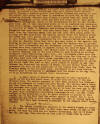 [p. 3] ber of group is
sufficient, part of them will continue
on down the river to Cabo Gracias,
sacking the Cape, and capturing all
available boats. If number is not
sufficient they will devote their
efforts toward drawing a guardia patrol
from Puerto Cabezas and wiping it out.
The number this group will have is
estimated at from 200 to 250 men
including Indians. Reports very clearly
indicate that all boats are being
commandeered on the river and more are
being built. This group will march on
Logtown, which is the destination as far
as the informants know. All of this
described above is to be combined and
synchronized with a group, supposedly
under Pedron, coming over land through
Wani to vicinity of Tunky to Kukalaya
and hitting the Bragman Bluff Lumber
Companies new construction line near
Santa Cruz. There is a well cut trail
through the Kukalaya swamp from the new
line. This group plans on hitting the
New Line after the Guardia patrol which
the Sacklin patrol has drawn out, have
passed out of Logtown. Then this group
will push on into Puerto Cabezas,
commandeering all transportation and
robbing as they go. Reports state that
there are many spies of the bandits now
working on the railroad line here, and
that the bandits are in possession of
full information and all necessary
details. (Several suspicious persons
have been reported in Logtown during the
last 60 days) two of them foreigners
(Europeans). The bandits plan on having
their adherents in Puerto Cabezas, and
on the line attend to such details as
cutting telephone lines demolishing
radio etc.. All informants state that
the bandits show surprising knowledge of
things along the line and in Port, and
that they have laid their plans
systematically and with care and that
everything gives signs of the bandits
having foreigners to advise and direct
them. The time of this joint attack is
stated as any time between the first and
middle of March, but the factor which
will determine it, will be the
conditions of the trails from Tunky
through the Kisalaya Swamp to the
railroad line. Informants do not know
whether the bandits plan on attempting
to raid the mines on the way over or to
go around them and conceal their
intentions. [p. 3] ber of group is
sufficient, part of them will continue
on down the river to Cabo Gracias,
sacking the Cape, and capturing all
available boats. If number is not
sufficient they will devote their
efforts toward drawing a guardia patrol
from Puerto Cabezas and wiping it out.
The number this group will have is
estimated at from 200 to 250 men
including Indians. Reports very clearly
indicate that all boats are being
commandeered on the river and more are
being built. This group will march on
Logtown, which is the destination as far
as the informants know. All of this
described above is to be combined and
synchronized with a group, supposedly
under Pedron, coming over land through
Wani to vicinity of Tunky to Kukalaya
and hitting the Bragman Bluff Lumber
Companies new construction line near
Santa Cruz. There is a well cut trail
through the Kukalaya swamp from the new
line. This group plans on hitting the
New Line after the Guardia patrol which
the Sacklin patrol has drawn out, have
passed out of Logtown. Then this group
will push on into Puerto Cabezas,
commandeering all transportation and
robbing as they go. Reports state that
there are many spies of the bandits now
working on the railroad line here, and
that the bandits are in possession of
full information and all necessary
details. (Several suspicious persons
have been reported in Logtown during the
last 60 days) two of them foreigners
(Europeans). The bandits plan on having
their adherents in Puerto Cabezas, and
on the line attend to such details as
cutting telephone lines demolishing
radio etc.. All informants state that
the bandits show surprising knowledge of
things along the line and in Port, and
that they have laid their plans
systematically and with care and that
everything gives signs of the bandits
having foreigners to advise and direct
them. The time of this joint attack is
stated as any time between the first and
middle of March, but the factor which
will determine it, will be the
conditions of the trails from Tunky
through the Kisalaya Swamp to the
railroad line. Informants do not know
whether the bandits plan on attempting
to raid the mines on the way over or to
go around them and conceal their
intentions.
5. A small group of bandits was reported
to have captured a native on the Pis Pis
trail about 15 miles from the end of the
new railroad line. The native supposed
to have been captured has disappeared
and all attempts to locate him have
failed. The capture man’s story was that
there were about 8 men in the bandit
group and that they kept him prisoner
over night questioning him as to when
the next pay on the line would be, and
when the farms on the new construction
line would be paid, also information
concerning commissaries etc. The man
either escaped or was permitted to go.
No great credence is placed in this
report, due to the fact that the motive
cannot be found. But it is a possibility
and fits in with the other information.
The so called bandits may very well have
been laborers discharged by the Bragman
Bluff Lumber Company.
6. The latest information relative to
the bandit attack on Ulwas on the night
of February 15th, is that there were
seven (7) men in the group, but that the
jefe was not Timoteo Altamirano, nor is
it known who the jefe was. They arrived
at 1900 15th at Ulwas from up the river.
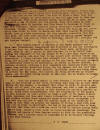 [p. 4] Lieutenant Benson, in his report
received 19th February, states that
witnesses say the bandit group were
Honduranians, that they were formerly
employed on the railroad line here at
Brown’s Camp. They did no material
damage; no verification of any killings
done by them has been received. They
fired several shots, stole $26.00 in
cash, and scattered a bag of flour over
the ground. They left Ulwas at 2300
February 15, went to Saulala, and from
there to Honduras by trail on the 16th
February. Benson reports having
thoroughly reconnoitered Kisalaya,
Waspam, Ulwas, Bilas Carmen, Saupuca and
Sacklin, and proceeding down river by
trail to Wasla and Kum. News reached
Lieutenant Benson from up river
concerning the four guardia deserters
from Neptune Mine, who have been
reliably reported as having passed
Waspuk 15th February, and gone up river
to Honduras. Benson will probably reach
Logtown tonight. [p. 4] Lieutenant Benson, in his report
received 19th February, states that
witnesses say the bandit group were
Honduranians, that they were formerly
employed on the railroad line here at
Brown’s Camp. They did no material
damage; no verification of any killings
done by them has been received. They
fired several shots, stole $26.00 in
cash, and scattered a bag of flour over
the ground. They left Ulwas at 2300
February 15, went to Saulala, and from
there to Honduras by trail on the 16th
February. Benson reports having
thoroughly reconnoitered Kisalaya,
Waspam, Ulwas, Bilas Carmen, Saupuca and
Sacklin, and proceeding down river by
trail to Wasla and Kum. News reached
Lieutenant Benson from up river
concerning the four guardia deserters
from Neptune Mine, who have been
reliably reported as having passed
Waspuk 15th February, and gone up river
to Honduras. Benson will probably reach
Logtown tonight.
7. This latest report of bandits on the
Wanks appears now to have been
tremendously exaggerated and distorted
by all our informants. I believe that
our informants have gained their ends,
partially at least, when we sent a
patrol to Cabo Gracias. It is my belief
that during the remainder of the dry
season we will have many repetitions of
these reports, and also that we may
expect more serious events than
heretofore. I firmly believe that
attempts will be made on commissaries
along the railroad line and perhaps on
the pay train, and very probably in
sufficient force to be successful. An
attack on Puerto Cabezas, I believe
unlikely, although a well commanded and
organized force could reach here without
detection during the dry season, and the
loot that they would get would be well
worth it. Particular pains are being
taken to protect the Pay train, the
Guardia car being protected by
boiler-plate, and the Guard strong
enough to make any, but an attack in
large force unsuccessful.
8. With the present patrol in Cabo
Gracias I believe we can solve some of
our troubles on the river providing that
they can be kept there during the dry
season. I recommend that steps be taken
to procure gasoline, out of bond, for
use at Cabo Gracias, and that a boat be
placed at the disposal of the Guardia in
Cabo Gracias for periodic patrols up
river. Under these circumstances, with
the cooperation of the people in Cabo
Gracias, we could patrol at least a part
of the Wanks without undue expenses, and
thus gain timely information of bandits
on river, and perhaps obviate these
expensive expeditions which accomplish
little, and are inclined to make the
bandits laugh at our inability to catch
up with them. At present the expense of
hiring a boat with crew etc. for up
river is exorbitant, but had we the
gasoline free of duty, the boat rent
free, and a crew who could be fed by
Guardia during their time of duty,
(hence a civic crew) we could accomplish
something. The Governor and people of
Cabo Gracias should do this for the
protection afforded, and I believe could
be compelled to do so without stirring
up too much trouble.
/s/ H N STENT
- - - - - - - - -
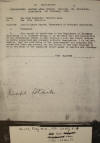 1st
Endorsement Col. John Marston,
Bluefields, 23 Feb., to Jefe Director
GN. 1st
Endorsement Col. John Marston,
Bluefields, 23 Feb., to Jefe Director
GN.
This report of conditions in the
Department of Northern Bluefields is of
interest though it is believed that the
description of the threatened attack on
Cabo Gracias and Puerto Cabezas is
purely conjecture and probably entirely
imaginative, I do believe, however, that
the activities of the "gun-runners" are
properly described and these may account
for the influx of new arms reported to
be in the hands of the organized bandit
gangs in Segovia and Jinotega.
RG127/43A
Transcribed by Pleet Initiative-funded
Lebanon Valley College
student-researcher Nicholas J. Quadrini.
|
